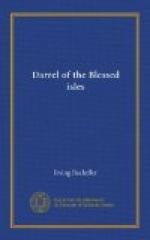“Tis a cruel part,” said Trove. “He is the murderer of the play. I cannot understand why there are so many villains in its cast, Both the cat and the serpent baffle me.”
“Marry, boy, the world is a great school—an’ this little drama o’ the good God is part of it,” said Darrel. “An’ the play hath a great moral—thou shalt learn to use thy brain or die. Now, there be many perils in this land o’ the woods—so many that all its people must learn to think or perish by them. A pretty bit o’ wisdom it is, sor. It keeps the great van moving—ever moving, in the long way to perfection. Now, among animals, a growing brain works the legs of its owner, sending them far on diverse errands until they are strong. Mind thee, boy, perfection o’ brain and body is the aim o’ Nature. The cat’s paw an’ the serpent’s coil are but the penalties o’ weakness an’ folly. The world is for the strong. Therefore, God keep thee so, or there be serpents will enter thy blood an’ devour thee—millions o’ them.”
“And what is the meaning of this law?”
“That the weak shall not live to perpetuate their kind,” said Darrel. “Every year there is a tournament o’ the sparrows. Which deserves the fair—that is the question to be settled. Full tilt they come together, striking with lance and wing. Knight strives with knight, lady with lady, and the weak die. Lest thou forget, I’ll tell thee a tale, boy, wherein is the great plan. The queen bee—strongest of all her people—is about to marry.[1] A clear morning she comes out o’ the palace gate—her attendants following. The multitude of her suitors throng the vestibule; the air, now still an’ sweet, rings with the sound o’ fairy timbrels. Of a sudden she rises into the blue sky, an’ her suitors follow. Her swift wings cleave the air straight as a plummet falls. Only the strong may keep in sight o’ her; bear that in mind, boy. Her suitors begin to fall wearied. Higher an’ still higher the good queen wings her way. By an’ by, of all that began the journey, there is but one left with her, an’ he the strongest of her people. An’ they are wed, boy, up in the sun-lit deep o’ heaven. So the seed o’ life is chosen, me fine lad.”
[1 In behalf of Darrel, the author makes acknowledgment of his indebtedness to M. Maurice Maeterlinck for an account of the queen’s flight in his interesting “Life of the Bee.”]
They sat a little time in silence, looking at the shores of the pond.
“Have ye never felt the love passion?” said Darrel.
“Well, there’s a girl of the name of Polly,” Trove answered.
“Ah, Polly! she o’ the red lip an’ the dark eye,” said Darrel, smiling. “She’s one of a thousand.” He clapped his hand upon his knee, merrily, and sang a sentimental couplet from an old Irish ballad.
“Have ye won her affection, boy?” he added, his hand on the boy’s arm.
“I think I have.”




